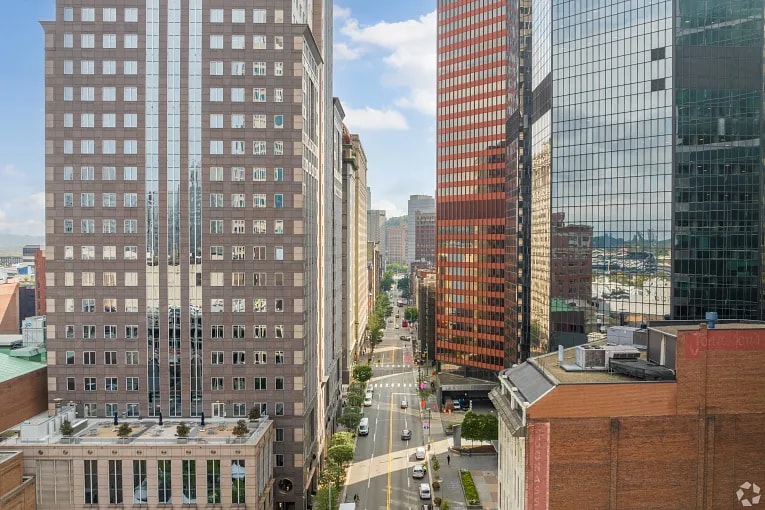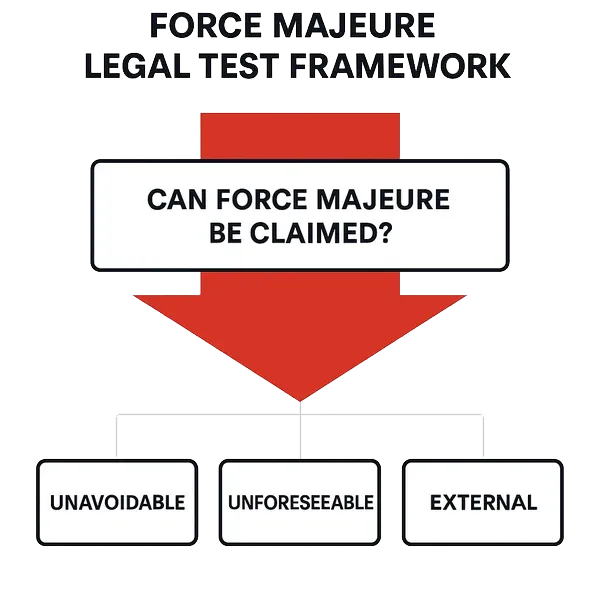Force Majeure Clause: What It Means for Commercial Real Estate Contracts

What Is a Force Majeure Clause?
A force majeure clause removes liability when unexpected events make it impossible to meet contract terms. These events must be outside either party's control, like natural disasters, government shutdowns, or pandemics.
In commercial real estate, force majeure clauses often appear in leases, construction agreements, and service contracts. They're used to pause obligations without penalty during qualifying events.
Legal Tests for Force Majeure

To enforce the clause, most courts require three things:
- Unavoidable: The event couldn't be prevented.
- Unforeseeable: It wasn't expected when the contract was signed.
- External: It wasn't caused by either party.
If all three apply, the party may be excused from performance, but only for the affected part of the contract.
Force Majeure Clause Examples in Real Estate Contracts
- Delays from hurricanes or wildfires
- Shutdowns from pandemics or health orders
- Permit delays from government agency closures
- Construction stoppages from material shortages or labor strikes
After COVID-19, many property owners discovered their contracts didn't cover public health emergencies. Now, newer contracts often include them by name.
Why CRE Investors Should Pay Attention
Force majeure clauses protect deals from breaking down when disaster strikes. But coverage depends on the exact language in your lease terms. If your clause is vague or outdated, it may not hold up in court.
Smart investors review these clauses before signing and make sure they reflect modern risks like pandemics, cyber disruptions, and supply chain failures.
Force Majeure Clause Sample
A well drafted force majeure clause does more than list disasters, it sets clear expectations for how parties handle disruptions. Below is a simplified sample tailored to commercial real estate contracts:
Sample Clause: "Neither party shall be liable for delays or failure in performance caused by acts beyond their control, including but not limited to natural disasters, government orders, pandemics, labor strikes, or supply chain interruptions. The affected party must notify the other in writing within ten (10) business days of the event. If the force majeure event continues for more than sixty (60) days, either party may terminate the agreement upon fifteen (15) days' notice."
What This Sample Covers
- Event Scope: Clearly defines what qualifies, natural and human-caused events.
- Notification Deadline: Sets a firm 10-day timeline to give notice.
- Termination Option: Gives both parties flexibility after prolonged disruption.
This language helps avoid vague interpretation and gives both landlords and tenants a legal playbook when major disruptions occur.
| Clause Element | Purpose |
|---|---|
| Event Scope | Defines which events qualify as force majeure (e.g. natural disasters, pandemics, government actions) |
| Notification Deadline | Specifies how quickly the impacted party must notify the other (often within 7 to 30 days) |
| Mitigation Requirement | Requires reasonable efforts to minimize impact or resume performance |
| Termination Option | Allows either party to exit the agreement if the event lasts beyond a set period (e.g. 60 days) |
This language helps avoid vague interpretation and gives both landlords and tenants a legal playbook when major disruptions occur.
CRE Specific Considerations
In commercial real estate, it's critical to customize the clause based on property type and market. For example:
- For office leases, include language about government-mandated closures or remote work restrictions.
- For retail or restaurant tenants, add supply chain disruptions and public gathering bans.
- For new developments, address delays in permitting or contractor availability.
These distinctions help align your clause with real world risks tied to specific commercial lease types.
Drafting Advice for Investors and Owners
Use specific terms, avoid phrases like "other unforeseen events" unless you define them. Broad language often fails in court. Also, add details about how long the exemption lasts, what proof is required, and whether rent, services, or both are paused.
When in doubt, consult a commercial real estate attorney. Force majeure language is only effective if it's detailed, tailored, and enforceable.
What to Do When Force Majeure Happens
Force majeure clauses only work if the response process is clearly defined. Investors and property owners should understand the timing, evidence, and obligations that follow once an event occurs.
Establish Notification Protocols Early
Most commercial contracts require prompt written notice, often within 7 to 30 days, after a force majeure event begins. Late notice can invalidate the claim.
Best practice: Use a standard template that includes the event date, impacted obligations, and expected duration. In some cases, the contract may require follow up updates if the disruption continues.
You Still Have to Try to Minimize the Impact
Even when protected by a force majeure clause, the affected party must make reasonable efforts to minimize the damage. This might include rerouting supply chains, shifting timelines, or using backup vendors.
For example, if a storm shuts down a warehouse, the tenant may be expected to secure a temporary storage facility, if that's a reasonable solution.
Build a Documentation Trail
To prove force majeure, documentation is key. Keep a detailed record of:
- Event reports (e.g. FEMA declarations, weather advisories)
- Internal communications showing how operations were affected
- Photos, vendor notices, or government orders
- Mitigation steps taken to resume performance
This evidence supports your claim and helps prevent disputes. It also ensures compliance with clauses in related agreements like CAM reconciliations or lien on commercial property documents.
What Force Majeure Covers, and What It Doesn't
Force majeure clauses typically excuse performance, not payment. That means you may be released from delivering services or meeting construction deadlines, but still required to pay rent or debt service.
Different Rules for Different Obligations
CRE contracts often separate payment obligations from performance duties. Unless your force majeure clause explicitly includes rent relief, courts usually enforce continued payment, even during disruption.
| Typically Excused | Typically Not Excused |
|---|---|
| Construction delays due to material shortages | Base rent payments under a lease |
| Inability to access premises due to government shutdowns | Loan servicing or debt payments |
| Delays in opening due to permitting office closure | Property taxes and insurance payments |
| Disruptions to supply chains impacting operations | CAM charges or NNN pass-throughs |
For example, a tenant unable to open due to a city-mandated shutdown may be excused from operating requirements but still owe base rent under a NNN rent lease.
Assessing Partial vs. Full Exemptions
Force majeure may suspend only part of a contract. If a supplier can't deliver on time but can still complete the work later, delay may be excused, but not cancellation. Most clauses specify that performance is only excused to the extent affected by the event.
Key Clauses to Watch
When reviewing or drafting, look for:
- Clear language about rent and payment obligations
- Definitions of "partial" vs. "complete" non-performance
- Whether delays trigger penalties or termination rights
Compare this across your gross lease or absolute net lease agreements—terms vary, and force majeure may apply differently across lease types.
If you're actively navigating lease terms, here are available office spaces near you that reflect today’s leasing environment.
Office Space for Rent
When Can You Terminate or Resume After Force Majeure?
Force majeure isn't meant to last forever. Most CRE contracts include a termination clause if the disruption continues too long, usually after 30, 60, or 90 days of non-performance.
Set a Clear Termination Trigger
Many agreements use a time-based threshold to prevent indefinite delays. A common example: if operations can't resume within 60 days, either party may end the contract with written notice. This protects both sides from uncertainty during prolonged events like pandemics or major supply chain failures.
Include Resumption Terms in the Clause
When the force majeure event ends, the contract should specify how and when obligations restart. Some leases require immediate resumption, while others allow a short grace period to mobilize resources.
Make sure your contract also clarifies whether deadlines reset or continue from where they left off. This avoids confusion, especially in build-out or delivery timelines tied to master lease agreements or phased delivery projects.
Decide Between Extensions or Exit Options
Not every deal needs to end. Some contracts allow deadline extensions instead of cancellation. In tougher market conditions, landlords and lenders might use a pretend and extend strategy to avoid default while giving time to recover.
Frequently Asked Questions
How do I know if my situation qualifies as a force majeure event in commercial real estate?
To qualify, the event must be unforeseeable, beyond your control, and make performance impossible, not just harder or more expensive. Check your contract language and consult legal counsel to confirm it meets those standards.
What steps should I take if I need to invoke a force majeure clause?
Review the contract, send timely written notice to all required parties, collect evidence of the disruption, and document all mitigation efforts, then stay in regular communication until the issue is resolved.
Does a force majeure clause pause rent payments?
Usually not, most CRE contracts separate financial obligations from performance duties, so unless rent relief is specifically included, payment is still required during a force majeure event.
How should I update my force majeure clause to reflect modern risks?
Add language for pandemics, cyber incidents, and supply chain disruptions, set clear notice timelines, require documentation, and tailor the clause to your property type and jurisdiction.
